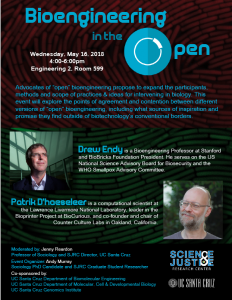Wednesday, May 16, 2018
4:00-6:00 PM
Engineering 2, room 599 (BitO poster) 
Bioengineering is an ascendant and elite field. Advocates of “open” bioengineering propose to expand the participants, methods and scope of practices & ideas for intervening in biology. Drawing on the perceived innovative successes of Silicon Valley, these advocates often promote analogies to computer and information technology to both frame and direct biological engineering’s development as a definitive technology of the twenty-first century. “Bioengineering in the Open” will explore the points of agreement and contention between different versions of “open” bioengineering, including what sources of inspiration and promise they find outside of biotechnology’s conventional borders.
Specifically, the event will compare the versions of “open” biotechnology espoused by a university-based bioengineer and a DIY biohacking collective. Drew Endy, Assistant Professor of Bioengineering at Stanford University, promotes the development of standardized biological engineering through the open-source Registry of Standard Biological Parts, working with biological systems to make them more “engineerable.” Oakland-based DIY “biohacking” and citizen science collective Counter Culture Labs compares the innovative powers of community laboratories to the garages that birthed many Silicon Valley startups and emphasizes “democratizing” and “demystifying” biotechnology by taking it outside the ivory towers of universities and research laboratories.
The Science and Justice Working Group will bring these advocates of different visions of “open” bioengineering together to discuss common concerns of innovation, accessibility, and intellectual property. Politics of openness in bioengineering have clear justice implications, as they present cases for who should be allowed to contribute to and benefit from the biology of the future. By shaping bioengineering in the image of computer and information technology, these political visions adopt some familiar models of participation and regulation. This raises some concerns, however: What lessons do these bioengineering advocates take from the less desirable features and outcomes—demographic inequality, monopoly, and information insecurity, for example—of the information technology industry? And does the push to equate biological engineering with computer engineering eclipse features that are unique to working with biomatter, like the ethics or risks of intervening in life forms that grow, mutate, and reproduce?
This working group event aims to discuss the following questions:
- What ends (Knowledge production? Innovation? Profit? Ethics?) do advocates of “open bioengineering” expect it to better serve?
- What does approaching biology as a form of engineering accomplish? What distinguishes “open,” as opposed to “closed,” engineering? What other analogies and metaphors do we have for developing and understanding biotechnology?
- Who does “open” biotechnology help get involved and how? Who should have the right to participate in and benefit from bioengineering? What are the benefits that they receive from open biotechnology?
- What are the risks and responsibilities of “open” bioengineering, and how are they distributed? How does “open bioengineering” anticipate and mitigate its own potential for harm?
Event Host:
Andy Murray, Sociology PhD Candidate and SJRC Graduate Student Researcher
Participants:
Drew Endy, Associate Professor, Stanford University
Patrik D’haeseleer, Co-founder and Chair, Counter Culture Labs
Jenny Reardon, Professor and SJRC Director, UCSC
Co-Sponsored by the UCSC Departments of Biomolecular Engineering; Molecular, Cell, and Developmental Biology, and the UCSC Genomics Institute.
